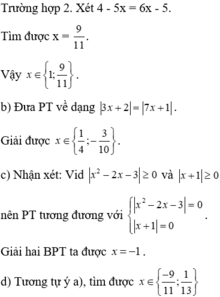Giải các phương trình sau 4(3x – 2) – 3(x - 4) = 7x + 20.
Hãy nhập câu hỏi của bạn vào đây, nếu là tài khoản VIP, bạn sẽ được ưu tiên trả lời.


1/ \(7x-5=13-5x\)
\(\Leftrightarrow12x=18\)
\(\Leftrightarrow x=\dfrac{3}{2}\)
Vậy: \(S=\left\{\dfrac{3}{2}\right\}\)
==========
2/ \(19+3x=5-18x\)
\(\Leftrightarrow21x=-14\)
\(\Leftrightarrow x=-\dfrac{2}{3}\)
Vậy: \(S=\left\{-\dfrac{2}{3}\right\}\)
==========
3/ \(x^2+2x-4=-12+3x+x^2\)
\(\Leftrightarrow-x=-8\)
\(\Leftrightarrow x=8\)
Vậy: \(S=\left\{8\right\}\)
===========
4/ \(-\left(x+5\right)=3\left(x-5\right)\)
\(\Leftrightarrow-x-5=3x-15\)
\(\Leftrightarrow-4x=-10\)
\(\Leftrightarrow x=\dfrac{5}{2}\)
Vậy: \(S=\left\{\dfrac{5}{2}\right\}\)
==========
5/ \(3\left(x+4\right)=\left(-x+4\right)\)
\(\Leftrightarrow3x+12=-x+4\)
\(\Leftrightarrow4x=-8\)
\(\Leftrightarrow x=-2\)
Vậy: \(S=\left\{-2\right\}\)
[----------]
1. \(7x-5=13-5x\) \(\Leftrightarrow12x=18\Leftrightarrow x=\dfrac{3}{2}\)
2. \(19+3x=5-18x\Leftrightarrow21x=-14\Leftrightarrow x=-\dfrac{2}{3}\)
3. \(x^2+2x-4=-12+3x+x^2\Leftrightarrow-x=-8\Leftrightarrow x=8\)
4. \(-\left(x+5\right)=3\left(x-5\right)\Leftrightarrow-x-5=3x-15\Leftrightarrow4x=10\Leftrightarrow x=\dfrac{5}{2}\)
5. \(3\left(x+4\right)=-x+4\Leftrightarrow3x+12=-x+4\Leftrightarrow4x=-8\Leftrightarrow x=-2\)

1. 3x( x - 2 ) - ( x - 2 ) = 0
<=> ( x-2).(3x-1) = 0 => x = 2 hoặc x = \(\dfrac{1}{3}\)
2. x( x-1 ) ( x2 + x + 1 ) - 4( x - 1 )
<=> ( x - 1 ).( x (x^2 + x + 1 ) - 4 ) = 0
(phần này tui giải được x = 1 thôi còn bên kia giải ko ra nha )
3 \(\left\{{}\begin{matrix}\sqrt{5}x-2y=7\\\sqrt{5}x-5y=10\end{matrix}\right.\)<=> \(\left\{{}\begin{matrix}y=-1\\x=\sqrt{5}\end{matrix}\right.\)
\(1. 3x^2 - 7x +2=0\)
=>\(Δ=(-7)^2 - 4.3.2\)
\(= 49-24 = 25\)
Vì 25>0 suy ra phương trình có 2 nghiệm phân biệt:
\(x_1\)=\(\dfrac{-\left(-7\right)+\sqrt{25}}{2.3}=\dfrac{7+5}{6}=2\)
\(x_2\)=\(\dfrac{-\left(-7\right)-\sqrt{25}}{2.3}=\dfrac{7-5}{6}=\dfrac{1}{3}\)

1/ \(2\left(x-5\right)=\left(-x-5\right)\)
\(\Leftrightarrow2x-10=-x-5\)
\(\Leftrightarrow3x=5\)
\(\Leftrightarrow x=\dfrac{5}{3}\)
Vậy: \(S=\left\{\dfrac{5}{3}\right\}\)
==========
2/ \(2\left(x+3\right)-3\left(x-1\right)=2\)
\(\Leftrightarrow2x+6-3x+3=2\)
\(\Leftrightarrow-x=-7\)
\(\Leftrightarrow x=7\)
Vậy: \(S=\left\{7\right\}\)
==========
3/ \(4\left(x-5\right)-\left(3x-1\right)=x-19\)
\(\Leftrightarrow4x-20-3x+1=x-19\)
\(\Leftrightarrow0x=0\)
Vậy: \(S=\left\{x|x\text{ ∈ }R\right\}\)
===========
4/ \(7-\left(x-2\right)=5\left(2-3x\right)\)
\(\Leftrightarrow7-x+2=10-15x\)
\(\Leftrightarrow14x=1\)
\(\Leftrightarrow x=\dfrac{1}{14}\)
Vậy: \(S=\left\{\dfrac{1}{14}\right\}\)
==========
5/ \(2x-\left(5-3x\right)=7x+1\)
\(\Leftrightarrow2x-5+3x=7x+1\)
\(\Leftrightarrow-2x=6\)
\(\Leftrightarrow x=-3\)
Vậy: \(S=\left\{-3\right\}\)
[---]
Chúc bạn học tốt.
1. \(2\left(x-5\right)=-x-5\)
\(\Leftrightarrow3x=5\)
\(\Leftrightarrow x=\dfrac{5}{3}\)
Vậy \(S=\left\{\dfrac{5}{3}\right\}\)
2. \(2\left(x+3\right)-3\left(x-1\right)=2\)
\(\Leftrightarrow2x+6-3x+3=2\)
\(\Leftrightarrow x=7\)
Vậy \(S=\left\{7\right\}\)
3. \(4\left(x-5\right)-\left(3x-1\right)=x-19\)
\(\Leftrightarrow4x-20-3x+1-x+19=0\)
\(\Leftrightarrow0x=0\)
Vậy \(S=\left\{x\in R\right\}\)
4. \(7-\left(x-2\right)=5\left(2-3x\right)\)
\(\Leftrightarrow7-x+2-10+15x=0\)
\(\Leftrightarrow14x-1=0\)
\(\Leftrightarrow x=\dfrac{1}{14}\)
Vậy \(S=\left\{\dfrac{1}{14}\right\}\)
4. \(2x-\left(5-3x\right)=7x+1\)
\(\Leftrightarrow2x-5+3x-7x-1=0\)
\(\Leftrightarrow-2x-6=0\)
\(\Leftrightarrow x=-3\)
Vậy \(S=\left\{-3\right\}\)

1:
a: =>3x=6
=>x=2
b: =>4x=16
=>x=4
c: =>4x-6=9-x
=>5x=15
=>x=3
d: =>7x-12=x+6
=>6x=18
=>x=3
2:
a: =>2x<=-8
=>x<=-4
b: =>x+5<0
=>x<-5
c: =>2x>8
=>x>4

a: =>(x-1)(3x-4)>0
=>x>4/3 hoặc x<1
b: =>x^3-3x^2-10x^2+30x+12x-36>0
=>(x-3)(x^2-10x+12)>0
Th1: x-3>0và x^2-10x+12>0
=>x>5+căn 13
TH2: x-3<0 và x^2-10x+12<0
=>x<3 và 5-căn 13<x<5+căn 13
=>3<x<5+căn 13

Bài 3:
b: \(\Leftrightarrow x^2\left(x+1\right)^2=0\)
hay \(x\in\left\{0;-1\right\}\)
c: \(\Leftrightarrow\left(x-1\right)\left(x^2+x+1\right)=0\)
=>x-1=0
hay x=1
d: \(\Leftrightarrow6x^2-3x-4x+2=0\)
\(\Leftrightarrow\left(2x-1\right)\left(3x-2\right)=0\)
hay \(x\in\left\{\dfrac{1}{2};\dfrac{2}{3}\right\}\)

4(3x – 2) – 3(x - 4) = 7x + 20.
⇔ 12x – 8 – 3x + 12 = 7x + 20
⇔ 9x – 7x = 20 + 8 – 12
⇔ 2x = 16
⇔ x = 8
Vậy phương trình có tập nghiệm S = { 8}